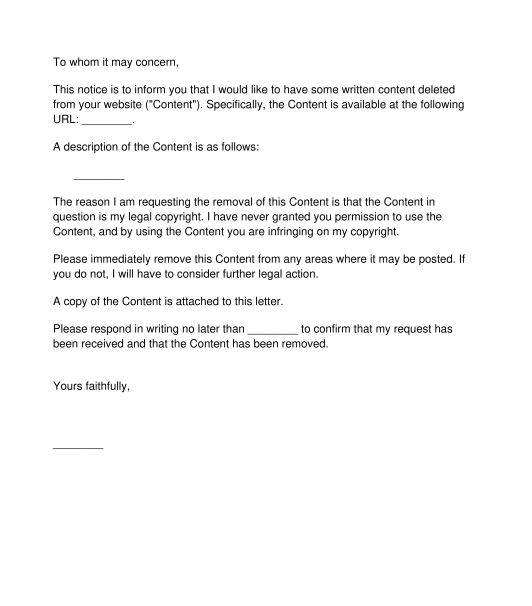 23/01/2025
23/01/2025

Answer a few questions and your document is created automatically.

Your document is ready! You will receive it in Word and PDF formats. You will be able to modify it.

 23/01/2025
23/01/2025
 Word and PDF
Word and PDF
 1 page
1 page
A Content Removal Request is a document through which someone can request that unauthorised written content be removed from a website or mobile app.
Usually, Content Removal Requests are sent when the sender of the letter owns the copyright in the written content and the recipient of the letter has posted it online without the sender's permission. This isn't always the case, though, as Content Removal Requests can be sent for other reasons, as well.
This Content Removal Request is distinct from a Trademark Infringement Cease & Desist Notice or a Copyright Infringement Cease and Desist Notice. In each of those documents, an official legal demand is being made to cease and desist the infringement or face further legal consequences. Here, the sender is simply asking for unauthorised content to be removed from a website or mobile app. If the sender owns the copyright, they may take further action, but the main purpose of this letter is just to get the content removed.
This document is quite short and simple. It will only request basic identifying details about the sender and the recipient of the removal request, as well as the URL or app name where the unauthorised content is hosted, and the reason why the removal request is being made.
It is possible that after this letter is received, the recipient will not immediately remove the content. If that happens, the sender may have to consider taking further legal action, if the content is copyrighted and being infringed.
This document can be sent as an email or a regular letter. If the user wishes, they can attach a copy of the unauthorised content. Then, it can be sent to the recipient. If it is being sent as a letter, it can be printed, signed, and posted, otherwise, it can be sent by email.
There are no specific laws that govern what must be put into a Content Removal Request. However, it's a good idea to give the recipient of the request as much information as possible to help them quickly find and remove the unauthorised content. If in doubt, seek legal advice.
Intellectual property in general is affected by a number of different laws in Australia. The Copyright Act 1968 (Commonwealth), and the Copyright Regulations 1969 (Commonwealth) may be relevant to the types of intellectual property with which this letter deals. Other significant intellectual property laws are also contained in the Patents Act 1990 (Commonwealth), Trade Marks Act 1995 (Commonwealth), Designs Act 2003 (Commonwealth), Plant Breeder's Rights Act 1994 (Commonwealth), and the Competition and Consumer Act 2010 (Commonwealth).
In addition, if the intellectual property in question is affected by laws of another jurisdiction (for example, if the intellectual property was created, or the person who owns the intellectual property is located, in another country) then the laws of that jurisdiction may also need to be considered.
You fill out a form. The document is created before your eyes as you respond to the questions.
At the end, you receive it in Word and PDF formats. You can modify it and reuse it.
Guides to help you
Content Removal Request - sample template
Country: Australia